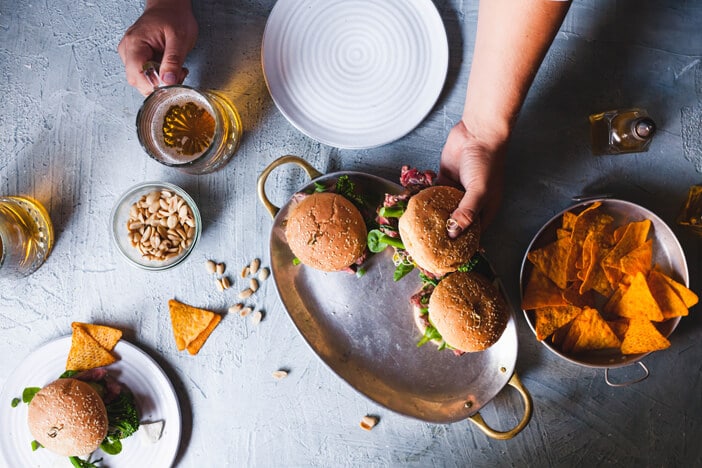The Cheat Day Myth- Does it really help you lose weight and build muscle?

- Add a cheat day to your diet and reach your goals faster
- What is a cheat day?
- Advantages of a cheat day for weight loss
- Don’ts: What to watch out for when losing weight with the help of a cheat day
- When should a cheat day be inserted?
- For whom are cheat days not suitable?
- Who are cheat days suitable for?
- Sources
Add a cheat day to your diet and reach your goals faster
Crash diets. We all know them and it’s easy to get tempted by the quick fix that they offer. Perfect when the vacation is just around the corner and you just want to drop a few pounds to fit into the newly bought summer dress. But how effective are such starvation diets really? And does a change to a diet in which one can indulge actually make more sense? In this article, you will find out what a “Cheat Day” is and how and why you should incorporate a cheat day into your diet to lose more weight and build more muscle.
What is a “Cheat Day”?
A cheat day is the day of the week when the diet is interrupted and you can eat what your heart desires. It is, so to speak, a day of indulgence, also called “Refeed Day” or “Loading Day”, on which foods are allowed that are on the taboo list the rest of the week. However, the exact interpretation and implementation for a cheat day are individual and flexible. Some indulge themselves for an entire day and prefer unhealthy and high-calorie foods, while others choose healthy alternatives and treat themselves to only one or two cheat meals a week. There are no precise rules for the choice of dishes or quantities. This means you can decide whether you eat whatever you want on this day or just relax your diet a bit.
Advantages of a cheat day for weight loss
You heard correctly: “Indulgence is allowed!”. Even better: a cheat day is not just allowed, but desirable, because it has the following advantages:
Relief and reward for your body and mind
Following a diet or a strict nutrition plan can be exhausting, both physically and mentally. It is not always easy to keep yourself in check and resist temptation. Exercising self-control 7 days a week can negatively affect your mood and rob your body of the necessary strength for doing effective workouts. If there are too many restrictions in your diet, you might sometimes become weak and impulsive. The food cravings overtake you, you reach for the bar of chocolate or bag of chips and, most of the time, do not just eat one piece but the entire package. This is followed by a guilty conscience, which can even lead to giving up on your diet or nutrition change entirely.
Hence why the cheat day, is an integral part of the Upfit nutrition plans: whether you want to lose weight, define your body, build muscle or just eat more healthily. A cheat day serves to offer you mental relief and is therefore not a sin. Of course, we encourage you to indulge in healthy foods, rather than the greasy fries and cheeseburger. A refeed day nourishes your body, gives you motivation for the next workout, and offers reward and comfort after an exhausting diet week. This makes it easier to lose weight because you don’t have to exercise self-control 7 days a week.
Makes it easier to get used to a diet change
From a scientific point of view, a proper cheat day can help you lose weight more sustainably. As part of a US study in New York, researchers found that the weekly cheat day does not negatively affect weight loss results. In spite of the weekly cheat day, the subjects (on a protein-rich low-fat diet) consumed around 30% fewer calories than those without a cheat day. The cheat days even helped the dieters to gradually accustom to the new and improved diet and thus to reduce weight more sustainably for the long term.
Makes sure your metabolism does not slow down
According to the Institute for Sports and Exercise Medicine in Hamburg, 95% of all diets fail. Only 5% of those who have been on a diet permanently maintain a weight that is below their original starting weight. These are usually people who have either previously been excessively overweight or those who have developed an eating disorder from following a diet. In most cases, the yo-yo effect after a diet causes people not only to return to their initial weights but to gain even more weight than before.
The reason for this is that the human organism shuts down to energy-saving mode during a diet. Evolutionarily, your body is set up so that, when you create a calorie deficit (for example, on a diet), it slows down your metabolism and thus energy consumption over a longer period of time to protect you during a possible hunger period. So if you add more calories to your body after a diet, it will use these as reserves for bad times in the form of fat deposits. A cheat day can prevent this because it regularly boosts the metabolism and thus prevents the slowing of the metabolism that occurs with most diets.
Helps keep hormones in balance
If the macronutrients carbohydrates and fats are reduced too drastically in the long-term weight loss process, there is a risk that your hormonal balance will be harmed. This can lead to muscle wasting and increased food cravings. Both are extremely unfavorable for your success. A cheat day lowers the risk of creating a fat or carbohydrate deficiency during your diet phase and helps keep your hormones balanced. A cheat day in a low carb diet is particularly important for replenish your energy reserves. Be sure to increase your carbohydrate intake moderately on your cheat day if you are following a low carb diet. Our BMI calculator can help determine your ideal calorie intake.
Don'ts: What you should watch out for when losing weight with the help of the Cheat Day

Don't No.1: insert more than 1 cheat day per week
So as not to jeopardize the weight loss effect, you should not take more than one cheat day per week. Two consecutive cheat days not only mean too much high-calorie food all at once but also increase the risk of falling back into old eating habits. Don’t have a fixed plan. Just because Sunday is your Cheat Day, for example, does not mean that you must indulge every Sunday. Can you make it a week without a cheat day? So much the better—you will look forward even more to next week!
Don't No.2: Excessive indulgence
Another “don’t” is excess. Hunger attacks with loss of control not only mean far too many calories, but they can also be harmful to health. There is a risk of overloading the body with too many unhealthy fats and sugars. This can overload the digestion and throw your intestinal flora out of balance. In the long run, this can lead to an eating disorder and even colon cancer. In addition, when you regularly eat large quantities of food, your stomach can become so stretched that subsequently only more generous portions lead to a feeling of fullness. The temptation to give in to your food cravings can be powerful. If you start indulging first thing in the morning, your stomach will get in the mood to continue feasting the rest of the day.
Don't No.3: Consume more than 3000 Kcal
You should never eat more than 3000 kcal on a cheat day. If you choose to add cheat meals to your diet, rather than a whole cheat day, you may cheat twice a week as long as the cheat meals stay below 1500 kcal. You can figure out your personal daily requirement and much more with our Calorie Calculator.
When should a cheat day be inserted?

If you want to lose weight, build muscle, or define your body, an optimal time for cheat day is the day before your toughest workout of the week. In this way, you can fill your energy stores and increase your motivation before your big workout. The result is not only increased success in the fitness department but also a better mood. However, this only applies to slightly larger portions or minor indulgences. We do not recommend it, but should you actually binge on very greasy unhealthy foods during your cheat day, take a day off instead. The clear cut helps you to better separate cheat day and a clean diet. By the way: we recommend avoiding alcohol entirely but should you indulge, do so only on your cheat day!
For whom are cheat days not suitable?
Cheat days—and diets in general—are unsuitable for people who have or have had an eating disorder. The constant alternation between control and enjoyment in eating behavior can lead to or reactivate serious disorders such as anorexia, bulimia, or a binge-eating syndrome. The cheat day is also not recommended for those who tend to be impulsive. Uncontrolled binge eating, as already mentioned, can significantly damage your health. In these cases, you should stick to the diet and treat yourself to something high in calories in small amounts only now and then. Tip: a food diary will help you document and, with time, improve your eating habits.
Who are cheat days suitable for?
Tired of the constant weight fluctuations that come with crash diets? You want to lose weight healthily and reward yourself in between with a little indulgence? Then let our nutrition experts create your individual nutrition plan—cheat day included—and get fit with Upfit. Get effective and long-term results—without calorie counting or food cravings!
Sources
- Arciero P.J. et. al 2016. Protein-Pacing Caloric-Restriction Enhances Body Composition Similarly in Obese Men and Women during Weight Loss and Sustains Efficacy during Long-Term Weight Maintenance. In: Nutrients 8 (8) 476
- Deutsche Gesellschaft für Ernährung (DGE), Österreichische Gesellschaft für Ernährung (ÖGE) & Schweizerische Gesellschaft für Ernährung (SGE). 2018. D-A-CH Referenzwerte für die Nährstoffzufuhr. 2. Auflage. Bonn
- k.A. 2014. The cheat system diet: eat the foods you crave and lose weight even faster. In: Publishers Weekly 261(16) 74-75
- k.A. 2013. The 3-1-2-1 Diet: Eat and Cheat Your Way to Weight Loss–Up to 10 Pounds in 21 Days. In: Publishers Weekly 260(44) 63
- Wirsching, T. & Wirsching, S. 2015. EVERYDAY IS A CHEATDAY: ohne Verzicht zum Traumkörper! 5. Auflage. Berlin: Epubli



